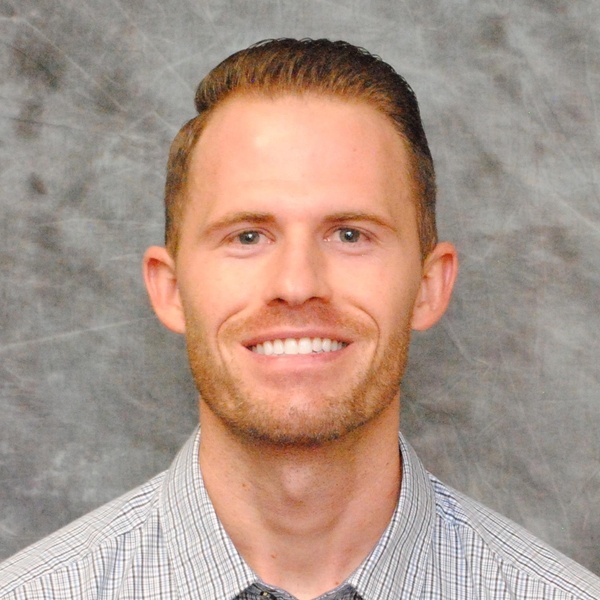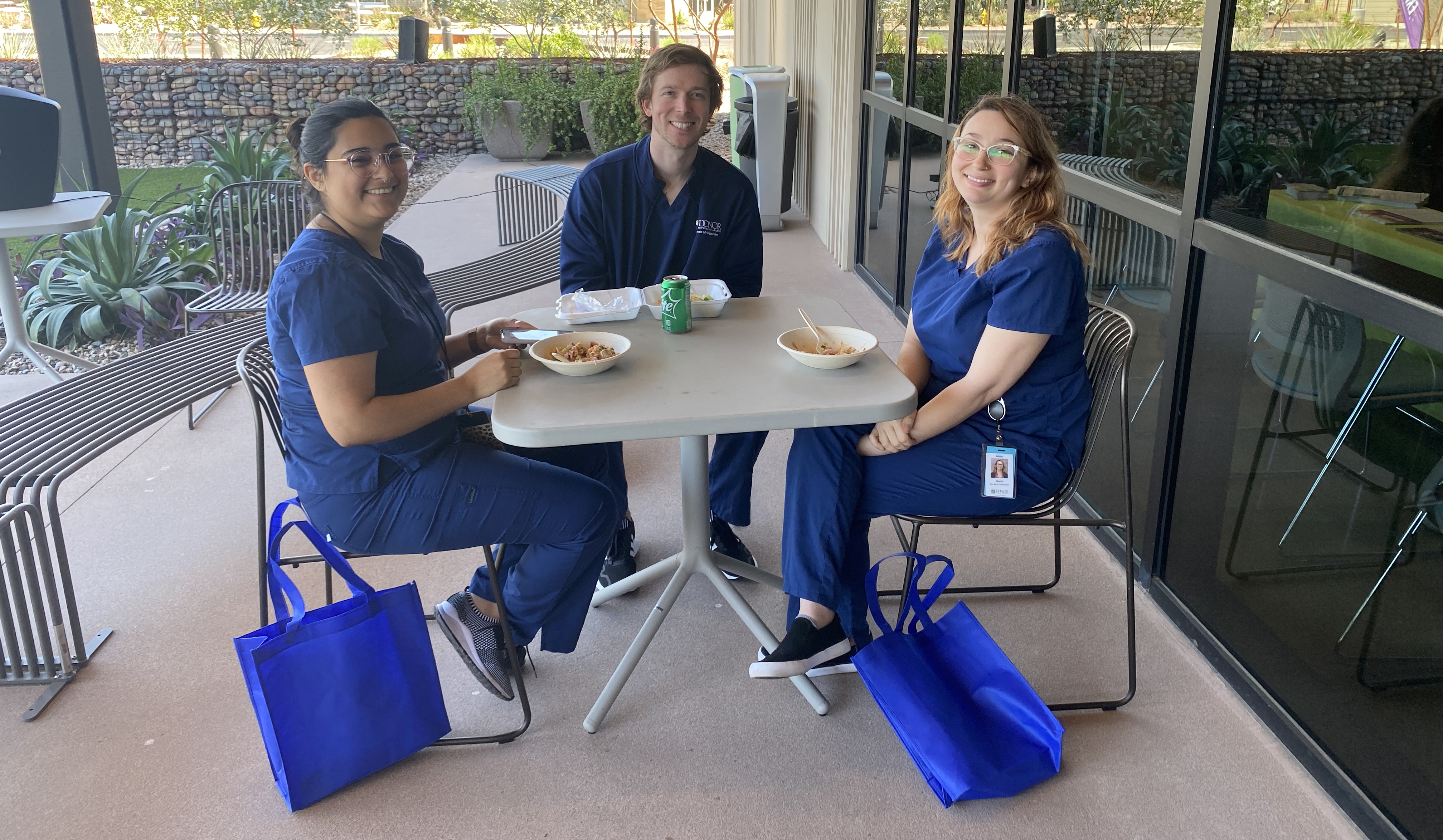

Integral to making the most of every opportunity to save and heal lives is Donor Network of Arizona’s (DNA) ability to track donation data, report data to hospital partners and others, and make strategic decisions for our organization. Business Intelligence does all of that and more. Data Intelligence is responsible for facilitating process improvement projects, processing hospital reports, analyzing and reporting donation related data, and managing Electronic Medical Record (EMR) system access for DNA staff in Arizona hospitals.
Donor Family and Advocate Services is privileged to provide care to families. The department has two sides, the advocacy side and aftercare side.
On the advocacy side, Donation and Family Advocates (DFAs) are responsible for donation conversations with families of potential organ and tissue donors in real time at hospitals or on the phone. Fundamental to our work is the understanding that most families, in a good moment, would choose to save and heal lives. However, we are meeting families in their worst moment. Having trained staff with backgrounds in working with families at times of trauma and grief allows for the most meaningful interactions with these families in which we can help them make their best decision about donation.
On the aftercare side, we provide opportunities for donor families to remember their loved ones and the precious gifts they so generously gave to others. We stay in touch with families for a minimum of two years after the death of a loved one and the selfless decision for donation.
We also facilitate the Arizona Donor Quilt project and invite donor families to dedicate a quilt square in memory of their loved one, which is then sewn onto a beautiful quilt attesting to the generosity of Arizona donors.
In addition, we coordinate communication between donor families and transplant recipients when both parties have indicated their readiness to reach out and get in touch.
Positions include: Donor Family Services Assistant & Donation and Family Advocate
Donor Program Development (DPD) collaborates with hospitals to maximize the potential for Arizonans to save and heal lives. Partnership is critical in our work to support donor families and honor the donation decisions of their loved ones.
DPD maintains successful donation programs by providing education and orientation on procedures and best practices to administrators, physicians, nurses, social workers, chaplains and other professionals across the state. We also conduct medical records reviews for quality assurance purposes.
By promoting best practices, providing high-level customer service, and implementing professional education, Donor Network of Arizona collaborates with health care professionals to support their essential role in the lifesaving and life-healing donation process.
Positions include: Donor Program Associate & Donor Program Coordinator
The Finance department’s purpose is to ensure Donor Network of Arizona (DNA) has the resources available to save and improve lives. During annual budgeting, Finance collaborates with all departments to ensure resources are allocated in alignment with our mission. Finance also coordinates payroll, accounts payable, billing, purchasing, allocating expenses, and many other tasks.
Finance ensures that DNA pays all expenses related to donation, and ensures no donor family is invoiced for these services. This includes items like hospital bills, transportation, recovery supplies and various tests to determine the suitability of organs for transplant.
The department prepares an annual IRS tax return and an annual Medicare cost report. It is Finance’s responsibility to continually evaluate the organization’s financial position to ensure we have the resources for our current operations as well as the reserves to continue operations in the event of unforeseen circumstances.
The Supplies department is responsible for clinical supply inventory, including receiving, stocking and kit-making. The Supply team works closely with the purchasing coordinator and clinical teams to ensure the proper supplies are available for recovery of organ and tissues, as well as for the processing of ocular tissue and performance of HLA testing. The Supply team plays a vital role in ensuring that the core clinical operations are successful, and that Donor Network of Arizona can achieve its mission to save and improve lives.
Donor Network of Arizona’s Histocompatibility and Immunogenetics Laboratory (HLA) provides histocompatibility testing services that locate matches for deceased donors’ selfless gifts.
These testing and screening services determine whether a donor’s tissue and blood type match those of a patient on the national organ transplant waiting list. Careful matching reduces the risk of a recipient’s body rejecting the donated organ.
Equipped with a state-of-the-art facility and a team of experienced and dedicated staff, HLA plays a vital role in the organ donation process by matching a donor’s generous gift to a recipient waiting for renewed life.
Testing services performed by HLA include blood typing and human leukocyte antigen (HLA) typing. HLA is accredited by the American Society for Histocompatibility and Immunogenetics.
The HR department utilizes effective human resources and talent management-related solutions to help enable and enhance the mission, vision, core values and goals of Donor Network of Arizona (DNA). HR is responsible for staffing, organizational training and development, staff member relations, total rewards (compensation and benefits), and safety.
We want to ensure that DNA has a mission-motivated and talented workforce that is representative of the communities we serve, for its current and future needs. We are cultural stewards and promoters who want to ensure a consistently great experience for DNA staff members in both the utilization of HR services and from working at DNA. We do this by applying our professional and technical competence and a people-oriented focus in order to exceed the expectations of our DNA staff members and other stakeholders.
Donor Network of Arizona’s (DNA) Marketing and Communications department works to share the importance of organ, eye and tissue donation and to encourage donor registration through collaboration with our health care, community and media partners.
The Marketing and Communication department oversees the Donate Life Arizona/Done Vida Arizona volunteer program that is made up of a dedicated group of transplant recipients, donor families and donation advocates who reach out to the community through education and donor registration events. Many volunteers also help put a face to donation by sharing their stories with the media.
The department also manages the DonateLifeAZ Registry. We work in partnership with the Arizona Department of Transportation Motor Vehicle Division (ADOT MVD) to offer Arizonans the opportunity to register as a donor when applying for or renewing their driver license or state ID. More than 95 percent of all donor registrations come from the ADOT MVD.
Through education and outreach, the Marketing and Communications department helps Arizonans say “yes” to the generosity of donation by encouraging donor registration.
The Organ Recovery Services team is made up of several vital roles in the donation process. The organ donation process begins with a call from one of Donor Network of Arizona’s (DNA) hospital partners notifying DNA of the imminent death of a patient. Upon referral, an organ recovery services coordinator will, in most cases, travel to the hospital to begin the process of determining what organs may be acceptable for donation.
If the potential donor has made the choice to register as a donor, our team collaborates with the hospital to clinically maintain the donation option and honor the donor’s decision to share life. If the patient has not decided, the patient’s family is invited to make the choice about donation on their loved one’s behalf.
Once donation is authorized, extensive information is gathered through laboratory and diagnostic tests. These tests are to ensure that donated organs are functioning and are safe to transplant. During this time, Organ Recovery Services works to identify recipients and schedule surgical recovery.
Organ recovery takes place in an operating room at the donor hospital. Organs are recovered by transplant surgeons, generally from the center that will be transplanting the donor organ(s) into their recipient(s). The donated organs are then transported to the hospital where the transplant will take place.
Positions include: Organ Recovery Coordinator, Organ Donation Coordinator, Referral Responder, Referral and Allocation Coordinator & Preservation Coordinator
Quality is an organizational function, not just the Quality department’s responsibility. We assure compliance with the regulatory and accrediting agencies by building quality in all processes from the beginning. Maintaining compliance with all agencies allows Donor Network of Arizona (DNA) to stay open and complete its mission. These same agencies require process improvement, which is something DNA builds into its organizational culture.
The Quality Assurance group reviews all tissue charts and releases ocular tissue for transplant as medical director designees. The Quality Systems group assures compliance by performing internal audits, vendor qualification, implementing document control, monitoring equipment program, and Corrective/Preventive Action/Complaint and Waiver/Deviation programs.
Positions include: Quality Assurance Coordinator & Quality Systems Coordinator
The first step in donation is the donor referral from Arizona hospitals and other organizations. Donor Network of Arizona’s (DNA) Referral and Donor Screening Services department (RDSS) receives more than 30,000 incoming donor referral calls annually from DNA’s health care partners. RDSS then facilitates these calls directly or refers them to Organ Recovery Services to perform intake, depending on the type of referral.
Additionally, donor support coordinators working in RDSS will initiate the donation conversation with families for tissue and cornea donation over the telephone. They are also available to answer incoming calls from donor families.
The RDSS department is the liaison with funeral home and transportation provider partners to ensure that donors and their families receive their desired arrangements following the donation process.
Twenty-four hours a day, seven days a week, DNA’s RDSS department offers excellent customer service to donor families and health care partners throughout the state.
Positions include: Donor Support Coordinator
As a tissue recovery organization registered with the U.S. Federal Drug Administration and accredited by American Association of Tissue Banks (AATB), Donor Network of Arizona (DNA) facilitates the tissue donation and recovery process.
The tissue and eye donation process begins with a referral notifying DNA of an individual’s death. At the time of the referral, a donation specialist will work closely with the person making the referral to determine if the individual is eligible for donation. A patient’s donor registry status is also verified at this time.
If the individual registered as a donor, our team contacts the family to gain additional information for donation. If the individual had not made the decision, the family is invited to make the choice about donation on their loved one’s behalf. Following determination of medical eligibility and authorization for donation by the individual or family, recovery takes place.
Tissue and eye recovery is performed by highly trained, skilled recovery staff. We are committed to honoring donors and their gifts with care, and recoveries are conducted with respect and gratitude. DNA takes pride in honoring the selfless decision donors and their families make to offer hope and healing for many.
Positions include: Tissue Recovery Technician and Tissue Recovery Coordinator

Get Your Donor ❤
Be sure to get the Donor ❤ printed on your driver license or state ID! Visit your local ADOT MVD office or an authorized third party office and check the box to register as an organ, eye and tissue donor. You can also visit azmvdnow.gov.
Get Your Donor ❤
